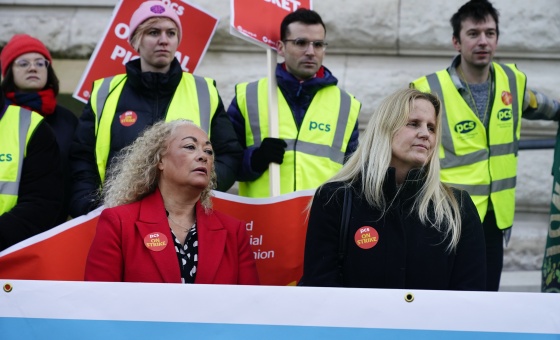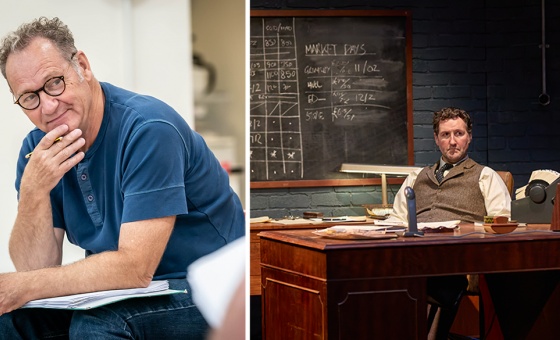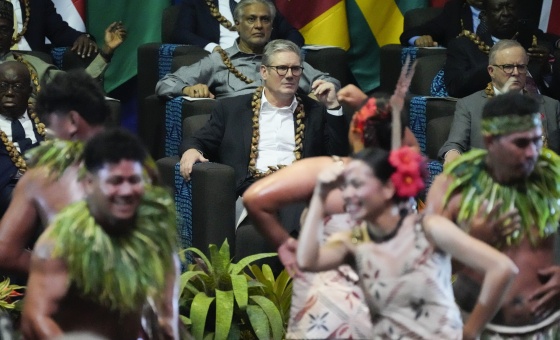This is the last article you can read this month
You can read more article this month
You can read more articles this month
Sorry your limit is up for this month
Reset on:
Please help support the Morning Star by subscribing here
WHILE the conflict in the Middle East and North African region (MENA) continues to destroy lives, images of horrific violence, since last October, have preoccupied millions around the world as the crisis has spread and intensified from Gaza to Lebanon.
Just five hours driving from Gaza, the El Gouna Film Festival presented its 8th edition (October 24-November 1), showcasing an outstanding programme of quality film, bringing the best in cinema from the MENA region and beyond.
The festival’s programme, while cherishing artistic values, also disrupts our easy, predictable understandings and makes us see things anew. Through screening, discussion, roundtable, exhibition, master classes, we observe today’s world as if for the first time.
Lebanese director Anas Zawahrti’s My Memory Is Full of Ghosts disrupts the simplification of the Syrian war found in Western media. This unconventional film talks about what is left of the city of Homs and its people; a visual elegy that explores a reality caught between past, present, and future. In the wrecked, destroyed neighbourhood, there is only agony and grief, a sense of absence, and apathy. A man sipping coffee says, “I am married to loneliness.”
The soundtrack recounts the stories of the habitants while the camera searches for traces of hope in the devastation. The landscape becomes a general reflection about the destiny of many places of war, whether Ukraine, Lebanon or Gaza. Here the international media have left, and we have stopped talking about it.
A deeply moving portrait of collective trauma and a painful echo of the absurdity of war and the strength of human being.
The festival once again presented “A Window on Palestine,” a space for Palestinian voices and stories during a particularly challenging period for the Palestinian people, endorsing the festival’s commitment to giving Palestinian film-makers an opportunity to share their experiences with global audiences.
The festival’s artistic director Marianne Khoury said: “You cannot be a festival in the region and not be part of what is happening in the world. This is touching us all, not only Palestinians and the Lebanese. We are all involved, so it is extremely important.”
Among those films was Mohammed Almughanni’s beautiful short An Orange From Jaffa based on the director’s own experience. It recalls his attempt to visit relatives in Jaffa. Travelling on a temporary Polish identity card he gets turned back from an Israeli checkpoint. When he tries at another, the guards discover it is his second attempt and both Mohammed and his taxi driver Farouk are made to wait. Tensions rise while the question of their fate is decided. This is a powerful work, offering a vibrant, explanatory picture of the psychology of the occupier and the occupied.
Ibrahim Handal’s A Short Film About Kids follows four kids from the refugee camp in Bethlehem who decide to visit the sea for the first time in their life. It is warm-hearted story of kids, beautifully shot, with a touch of comedy: both magical, human, and of deep significance.
In Rakan Mayasi’s The Key the title refers to a symbol used by the Palestinians to represent the diaspora of 1948. In this short movie, an Israeli family’s equilibrium gradually disintegrates as the mysterious sound of a key is heard every night in the door of their apartment, as if someone outside is trying to get in. A political fantasy-thriller, with a well-written, absorbing central mystery, that is a clear metaphor for the millions of Palestinians living in the diaspora.
Palestinian director Laila Abbas’s Thanks for Banking With Us! reminds us that not all stories from Palestine are tales of conflict, but sometimes just simply being a woman is its own battle. This film, with elements of black comedy, sees squabbling Palestinian sisters team up against the abuse of a patriarchal sociocultural and legal framework. A wonderfully heartfelt and tender thing, delicate, unstinting and clear-eyed.
This year’s festival showed a strong commitment to the female gaze, with a robust presence of movies made by female directors.
Egyptian director Jaylan Auf’s The Inevitable Journey to Find a Wedding Dress follows as a bride’s frantic search for a wedding dress on the eve of the ceremony becomes a journey of self-discovery, challenging her relationship with the city of Cairo and with her own identity. A light-hearted, contemporary comedy, subtly showing the class gap, thick with jokes, that feels fresh, effortless, and genuine.
The festival also featured Algerian director Chakib Taleb-Bendiab’s Algieres, which has recently been announced as the 2025 Oscar entry from Algeria. Based on real events, it tells the story of the abduction of a little girl, in a poor neighbourhood of the Algerian capital. Dounia, a skilled psychiatrist, and Sami a committed police inspector, team up to investigate Algeria’s dark past to solve a bloodcurdling case.
The movie reaches a universal level, telling a story of child abuse that can happen in any corner of a modern city, something that we don’t want to see in our society. It is intriguing, gripping and well-acted with a solid script. The story, humane and complex, talks of moral obligations and personal and professional values. But perhaps more significant is its feminist tone because in the end it is a striking story of women’s empowerment in contemporary society.










